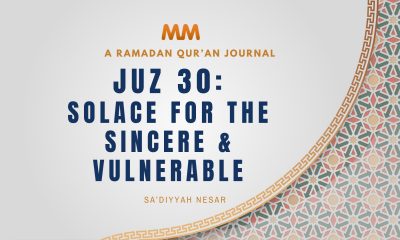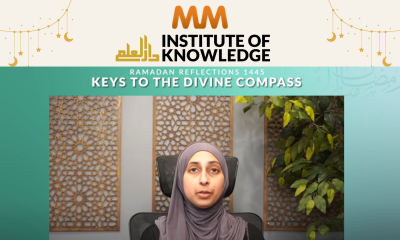Ramadan
Ramadan Prep | Day 6 – Wisam Sharieff | Quitting Bad Habits this Ramadan
Published
By
Guests
Lecture by Wisam Sharieff | Hosted by Br. Abdullah Syed | Transcribed by Sameera
[The transcript includes slight modifications for the sake of readability and clarity.]
www.ramadanprep.com
Ramadan Prep 2012 Lectures, Sponsored by
Bayyinah Institute | QuranWeekly | MuslimMatters
Keep supporting MuslimMatters for the sake of Allah
Alhamdulillah, we're at over 850 supporters. Help us get to 900 supporters this month. All it takes is a small gift from a reader like you to keep us going, for just $2 / month.
The Prophet (SAW) has taught us the best of deeds are those that done consistently, even if they are small. Click here to support MuslimMatters with a monthly donation of $2 per month. Set it and collect blessings from Allah (swt) for the khayr you're supporting without thinking about it.
[HTML1]
[Wisam Sharieff]: Al-salāmu ‘alaykum waraḥmatullāh Ramadan Prep and fellow Quran Weekly viewers. I pray that Allāh 
In the few minutes we have together, I was hoping to discuss how to break bad habits. When you think about Ramadan, you think about letting go of that which is ḥalāl– food and drink – and then you start thinking that if you can let go of that which is halal, then you should have an easier time letting go of those habits which is falling into the forbidden category. What we will discuss today are four constructive ways to not only ask Allāh 
One of the things we discussed last Ramadan – and some of you may have caught it; it was myself and br. AbdelRahman Murphy in Ramadan Prep – was quarantining or finding things you wanted to better yourself during this Ramadan. Myself, Maulana Abdul Nasir, and br. AbdelRahman all sat together and had the Ramadan resolution program. I would like you to first find out what exactly it is that Allāh 
More importantly, there are things that are affecting our īmān: missing the prayer, not reading Qur’an, having a more stern tone with our parents. Allāh 
First Step: Recognize Your Mistake
The first step to breaking a bad habit is to quarantine it and realize that you are making a mistake. This comes in acceptance and in asking Allāh 
Most of us may not have these issues. I think some of us have more personal issues, whether it is the type of music we are listening to, what we view on the internet, or even just hanging out with friends and what we do in the evening time and what types of conversations we have.
The first thing we are going to tackle is quarantining the mistake and understanding that this is something I am dealing with and I can’t bring myself more into this on a personal level. Until you are giving someone else advice, you can always feel high and mighty. When you take your mistake and your ills – whether it is what you view or who you talk to or the excuses you make to stay away from that which Allāh has ordained for us (prayer, separation of the sexes) – these are the things that until you accept them on your own, you won’t go very far.
Allāh 
Once you accept that this is one of your issues, then you are able to inform people around you. This is going to be within step 1. Once you’ve accepted you have a bad habit, then I’m going to encourage you to bring someone into the picture. It could be a best friend, a mentor, a parent. Trust me, your parents trust you a lot more than you understand. If you feel like your parents are up to it, then go ahead and inform them.
I inform a friend and say, “Look man, I’ve been struggling with this recently. I’ve been struggling with a loose tongue / spending a lot of time watching clips on YouTube / just being lazy in general.” Once you’ve informed a friend, you have that friend checking on you every once in a while.
Step 2: Talk to Allāh
The second phase is that we need to bring Allāh 

We have to realize in the second phase that we are bringing someone in to quarantine our mistake and telling a friend, and then we are constantly telling Allāh. It is not about eradicating or forgetting about your habit all at once. It is about saying, “You know what, Allāh? I’m going to give it an effort. You’ve given me everything else perfect.” Name the other bad habits that you don’t have. “I’m not drinking, I’m not hanging out at the lounge, I’m not doing the haram things that could be done. This one thing is something I’m working on, and Allāh, I want you to help me break it down.” In the second phase, you are going to be asking Allāh with various du‘ā’s and various supplications that He has given us from the Qur’an.
Allāh 


In this āyah, Allāh says, “There is no one who can forgive you except Allāh.” This is the only part of advice that I’m giving on a personal level. Sometimes it feels like if I rectify this, then this person will think better of me or this person will forgive me. I want you to make the focus at home that I’m not doing this habit – whether it is something as simple as the uncleanliness of biting your fingernails or something that is a little bit more serious such as being addicted to a cigarette – these are the types of things that you want to now quarantine and ask Allāh for. The second step is bringing Allāh 
In the first step, we quarantined it and spoke about it in a negative fashion. “I really think wasting time on the internet is bad.” Make it clear to your friends. When they talk about it in a lighthearted way, tell them, “This is something really important to me.” Don’t take part in demeaning a sin. Once it becomes light and easy to carry around, it is not a big deal. It is like something I read on the plane on the way here: someone tweeted, “I really hate it when people say, ‘Excuse my French and use aggressive language.’” It is not a French word and a way of saying, “Pardon me, but I’m still going to do something that is deemed offensive.”
No matter how you see this, accept that only Allāh can forgive you. Don’t look for forgiveness in other people’s mind. Don’t look for Allāh 
We are doing this exercise before Ramadan because we are pre-Ramadan and we want to get hyped up and revved towards the direction of making a change. Last Ramadan we were changed, right? Last Ramadan we came off on a spiritual high and had Qur’an going all Ramadan and had Maulana Abdul Nasir with his tafsir nights of Surah Yaseen. What I’m asking you to do now bi’idhnillāh is to go back to the last few days of Ramadan and don’t start from scratch. Quarantine the mistake, bring Allāh 
Step 3: Replace the Bad Deed
The third step is replacing that bad deed. You have to remember that Allāh forgives our bad deeds, and there is none other than Him. If we don’t realize this, then we won’t realize that this is empty advice unless we are going to replace it. If you are having trouble with something on the internet, then find something else to watch. If you tend to watch movies a lot, then try to quarantine and limit that time.
The third step is replacing the habit. Let me give you a smaller example. Some people who stay away from smoking start to chew gum. If you have the habit of listening to something on your stereo, replace it. I’m not going to say with necessarily a nashīd, but get into something a little bit more entertaining whether it is the news, talk radio. There are a lot of durūs that you can listen to. I’m not going to promote listening to lectures all the time, but if you can start making a schedule, it helps to replace the habit that you have.
Step number three is effectively replacing the habit that you have with something more positive. The only way you can do this is to definitely have a schedule. Have a schedule for Ramadan! When you have a schedule in Ramadan, then you’ll know what time you are getting up. Ten minutes after suḥūr, you are going to read two or three āyahs or a page three or four times. Remember if Allāh multiplies by seventy or seven hundred, don’t get into the habit of doing a good deed once in Ramadan. This is your chance. Do it again and again and again.
Finally, during Ramadan, I want you to make an effort to not doing things. I know there’s a strong push to go see whatever movie is coming out. This is your chance to say, “Allāh, You’ve given us this month of Ramadan and I’m going to take it the step further. I’m not going to try to rationalize and figure out. I’m just not going to do it.” It is going to be that third step: replacing it with a good deed and where you feel like you can pretend to be religious. Remember the hadith of the Prophet 
Keep this in mind. Ramadan is an opportunity to take a step back and remove that one thing from your repertoire.
Step 4: Set Up a Way Not to Make This Mistake Again
Last but not least is the fourth step. Speak to someone, have an internet guide. Don’t hang out with friends who encourage that mistake.
I ask Allāh 

Keep supporting MuslimMatters for the sake of Allah
Alhamdulillah, we're at over 850 supporters. Help us get to 900 supporters this month. All it takes is a small gift from a reader like you to keep us going, for just $2 / month.
The Prophet (SAW) has taught us the best of deeds are those that done consistently, even if they are small. Click here to support MuslimMatters with a monthly donation of $2 per month. Set it and collect blessings from Allah (swt) for the khayr you're supporting without thinking about it.

Israel Seeks Escalation For Latitude – The Regional “Conflict” Widens

Post-Ramadan Reflections From A Mother Of Littles

[Podcast] Palestine in Our Hearts: Eid al-Fitr 1445 AH

Foreign Affairs Official Resigns Over Gaza Genocide

A Ramadan Quran Journal: A MuslimMatters Series – [Juz 30] Solace For The Sincere And Vulnerable

IOK Ramadan: 7 Qualities of Highly Effective Believers | Keys To The Divine Compass [Ep18]

IOK Ramadan: Choose Wisely | Keys To The Divine Compass [Ep15]

IOK Ramadan: Making Time for Allāh at Night | Keys To The Divine Compass [Ep21]

IOK Ramadan: Appreciating the Prophet ﷺ | Keys To The Divine Compass [Ep22]

IOK Ramadan: They Were Not Created Without Purpose | Keys To The Divine Compass [Ep23]

IOK Ramadan: The Importance of Spiritual Purification | Keys To The Divine Compass [Ep30]

IOK Ramadan: The Power of Prayer | Keys To The Divine Compass [Ep29]

IOK Ramadan: The Weight of the Qur’an | Keys To The Divine Compass [Ep28]

IOK Ramadan: Families of Faith | Keys To The Divine Compass [Ep27]

IOK Ramadan: Humility in Front of the Messenger | Keys To The Divine Compass [Ep26]
Trending
-
#Islam3 weeks ago
IOK Ramadan: 7 Qualities of Highly Effective Believers | Keys To The Divine Compass [Ep18]
-
#Islam3 weeks ago
IOK Ramadan: Choose Wisely | Keys To The Divine Compass [Ep15]
-
#Islam2 weeks ago
IOK Ramadan: Making Time for Allāh at Night | Keys To The Divine Compass [Ep21]
-
#Islam2 weeks ago
IOK Ramadan: Appreciating the Prophet ﷺ | Keys To The Divine Compass [Ep22]





Pingback: Ramadan Prep | Day 11 – Yaser Birjas | 5 vs. 5 - MuslimMatters.org
Pingback: HOW TO REALLY GET READY FOR RAMADAN — Jamiatul Ulama KZN